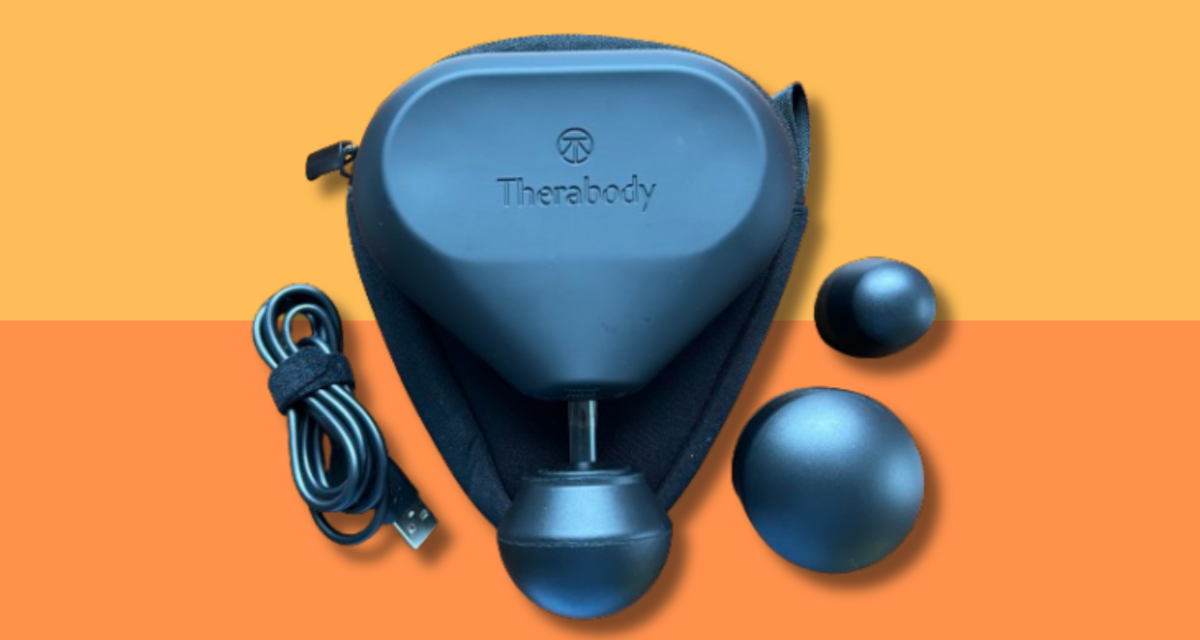For a while, it seemed like recovery devices — foam rollers, vibrating massagers, compression gear, and the like — were growing in size with each iteration. Compression socks are nice, but how about compression boots? Why have a foam roller for your calves if you can get one that also accommodates your back?
Now that many of us have amassed whole storage closets’ worth, recovery tools seem to be trending in the opposite direction, with smaller sizes that are more conducive for storing, traveling, and handling in general. The puzzle for their designers is how to pack just as powerful of a punch in a more compact product.
The second generation Theragun Mini by Therabody is one such device that offers consumers an alternative to the bigger and pricier Theragun Pro and Theragun Elite, both of which — like the Mini — are handheld percussive massage devices meant to enhance recovery, performance, sleep, mobility, and stress.
Having added it to my recovery arsenal for a couple of weeks of daily use, here’s what I discovered and ultimately thought about the Theragun Mini:
The setup and learning processes are negligible
If you bemoan gadgets with complicated setup processes and steep learning curves, you’ll love how intuitive the Theragun Mini is. To start using it, all you have to do is remove it from the box, charge it using the included cable, and then hold down the only button on the device to turn it on.
The Theragun Mini is seriously compact.
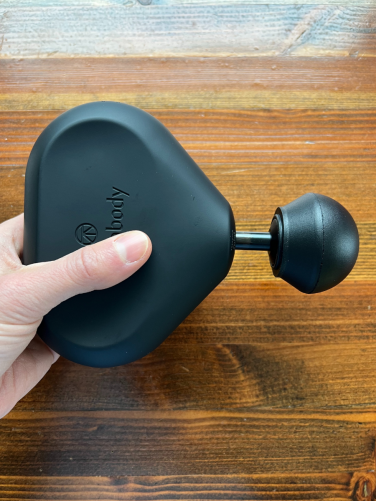
Credit: Becky Wade Firth / Mashable
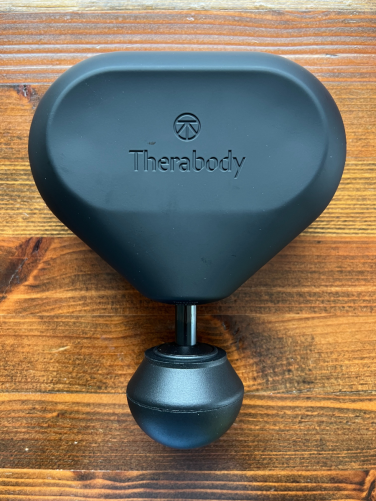
Credit: Becky Wade Firth / Mashable
Once it’s on, you’re supposed to “float” the Theragun Mini across whichever body parts you want to target. I especially love the way it feels on my chronically tight calves, which I regularly hit for a few minutes while lounging before bed.
Once you get a feel for the device, you can toggle between three vibration speeds (1750 pulses per minute or PPM, 2100 PPM, and 2400 PPM) by tapping the power button; the current speed is shown on the LED speed indicator right next to it. To turn it off, simply hold down the power button again. That’s all there is to it.
It’s compact and ergonomic
Most handheld massagers have a handle, which can be nice for leverage but tricky to stuff into a backpack or carry-on. Since it’s meant for travel, I appreciate that the Theragun Mini is handle-less. It looks like a tiny bike seat with rounded edges and a nozzle at the end and packs up nicely into the triangular soft case that’s included. It’s also surprisingly ergonomic, with a smooth grip and shape that makes it easy to hit specific areas with various degrees of pressure.
Weighing one pound and measuring 5.55 x 4.92 x 1.93 inches, the Theragun Mini is on the smaller side of even travel massagers. The Theragun Mini 2.0 is 20 percent smaller and 30 percent lighter than the previous generation, and significantly smaller than a competitor, the Hyperice Hypervolt Go 2, which weighs 1.5 pounds and measures 6.7 x 7.3 x 2 inches. Such differences might not sound like much, but if you’re trying to travel light, every little bit of saved space and weight matters.
It includes three attachments
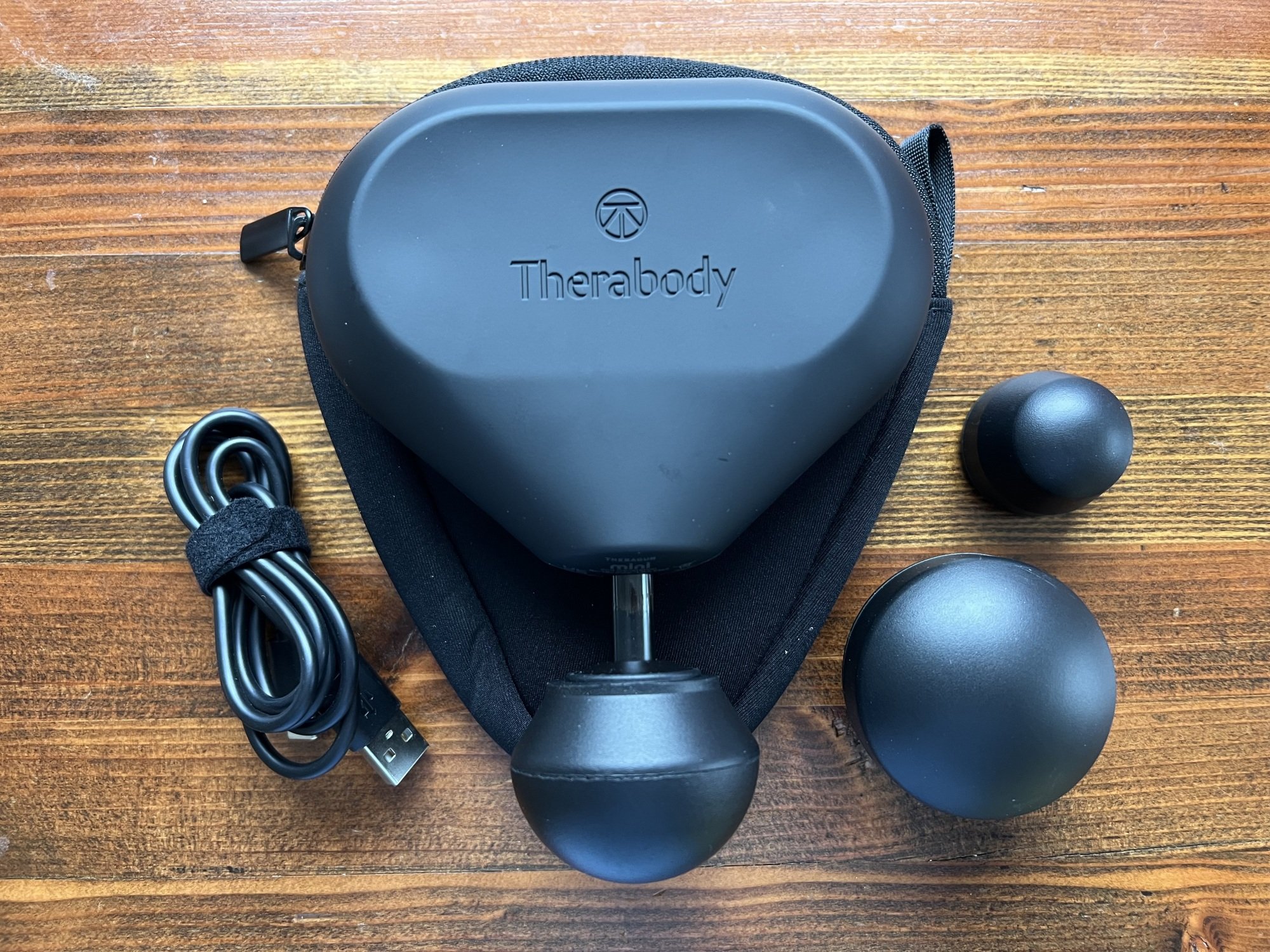
Therabody was very straightforward with the Mini’s attachments.
Credit: Becky Wade Firth / Mashable
Maybe it’s just me, but I almost never bother to swap out the heads on my recovery tools. The one that comes attached is usually the most neutral, universally pleasing of the mix, so I typically roll with it and leave the others in the box. That was the case with the Theragun Mini; it includes three attachments (standard ball, dampener, and thumb), but I was happy enough with the standard ball that I kept it on except for quick trials of the other two. All three worked well, and I actually find that it’s not the head of the massager that matters as much as the pressure I put into it.
The battery life is fine
The Theragun Mini özgü a battery life of two hours and can be recharged with the included USB-A to USB-C charging cable. That limit is pretty typical of handheld massagers and, in most cases, should be long enough to get through an average trip without dying. Perhaps a larger body could accommodate a larger battery, but being that the Theragun Mini is marketed as a travel device, the tradeoff probably wasn’t worth it.
You can connect it to the Therabody app — but will you really?
These days, there’s an app for almost everything. So I was unsurprised to learn that a Therabody app exists and that the Theragun Mini, like all of the company’s devices, connects to it via Bluetooth. Knowing I’d likely never use it, I still wanted to download the app to see if it added anything to my massage experience.
Short answer: for me, no. The app is cluttered and overwhelming and full of written instructions for whatever Therabody device you’ve paired to it. The travel tab, for example, offers a four-minute whole body routine with every 30 seconds focused on a different body part. Beyond not wanting to mess with an app (nor squint at the tiny font) while self-massaging, I know that recovery is way more personal and nuanced than the app makes it out to be. I’d rather listen to my body and decide for myself where I should hit, when I should add pressure, and when I should move on to the next area.
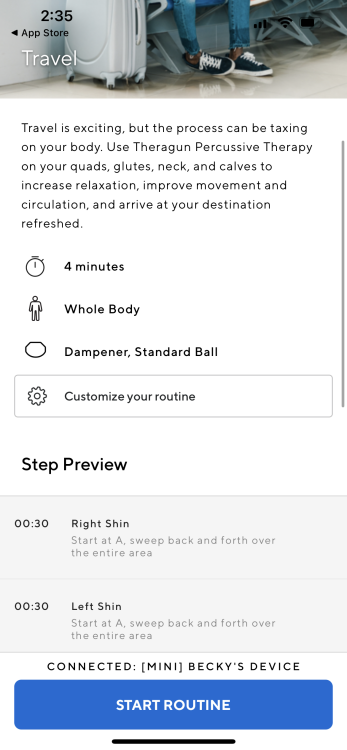
The app might be useful for people new to recovery, but I found it unnecessary.
Credit: Screenshot: Therabody
Perhaps someone who’s brand new to exercise or seeking guidance on their recovery routine would benefit from the Therabody app. But honestly, I think it’s unlikely.
Is the Theragun Mini worth it?
The Theragun Mini özgü a lot going for it: It’s easy to set up and use. It özgü a nice size and shape for handling and taking on the go. Most importantly, it doles out an effective massage just about anywhere I want to use it. In addition to my calves, which got the most attention during my kontrol period, I used it on my quads, hamstrings, hip flexors, and glutes, and always felt a little looser and warmer after just a few minutes of use.
The downsides of the Theragun Mini are minimal. The battery life is unremarkable. The extra attachments weren’t super useful (to me). I’d likely never use an app in conjunction with this or any other recovery device. And lastly, the price of $199 is steep relative to your run-of-the-mill massage gun, especially if you’re looking for a backup device that you’ll exclusively use for travel.
Taking all of that into consideration, I conclude that the Theragun Mini is one of my favorite handheld massagers — travel or otherwise — and one that I’d recommend to other active individuals.
Topics
Health
Fitness Equipment

